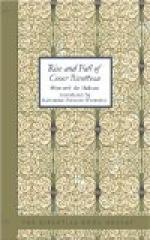“Folly of youth,” said Birotteau, assuming for the nonce the tone of a free-thinker.
“Listen to me, Birotteau! You are all upset; you don’t go to the manufactory any more; there is something the matter, I feel it! You must tell me; I must know what it is.”
“Well,” said Birotteau, “we came very near being ruined,—we were ruined this very morning; but it is all safe now.”
And he told the horrible story of his two weeks’ misery.
“So that was the cause of your illness!” exclaimed Constance.
“Yes, mamma,” cried Cesarine, “and papa has been so courageous! All that I desire in life is to be loved as he loves you. He has thought only of your grief.”
“My dream is fulfilled!” said the poor woman, dropping upon the sofa at the corner of the fireplace, pale, livid, terrified. “I foresaw it all. I warned you on that fatal night, in our old room which you pulled to pieces, that we should have nothing left but our eyes to weep with. My poor Cesarine, I—”
“Now, there you go!” cried Cesar; “you will take away from me the courage I need.”
“Forgive me, dear friend,” said Constance, taking his hand, and pressing it with a tenderness which went to the heart of the poor man. “I do wrong. Misfortune has come; I will be silent, resigned, strong to bear it. No, you shall never hear a complaint from me.” She threw herself into his arms, weeping, and whispering, “Courage, dear friend, courage! I will have courage for both, if necessary.”
“My oil, wife,—my oil will save us!”
“May God help us!” said Constance.
“Anselme will help my father,” said Cesarine.
“I’ll go and see him,” cried Cesar, deeply moved by the passionate accents of his wife, who after nineteen years of married life was not yet fully known to him. “Constance, fear nothing! Here, read du Tillet’s letter to Monsieur de Nucingen; we are sure to obtain a credit. Besides,” he said, allowing himself a necessary lie, “there is our uncle Pillerault; that is enough to give us courage.”
“If that were all!” said Constance, smiling.
Birotteau, relieved of a heavy weight, walked away like a man suddenly set at liberty, though he felt within him that indefinable sinking which succeeds great moral struggles in which more of the nervous fluid, more of the will is emitted than should be spent at one time, and by which, if we may say so, the capital of the existence is drawn upon. Birotteau had aged already.
* * * * *
The house of A. Popinot, Rue des Cinq-Diamants, had undergone a great change in two months. The shop was repainted. The shelves, re-varnished and gilded and crowded with bottles, rejoiced the eye of those who had eyes to see the symptoms of prosperity. The floors were littered with packages and wrapping-paper. The storerooms held small casks of various oils, obtained for Popinot on commission by the devoted Gaudissart.




